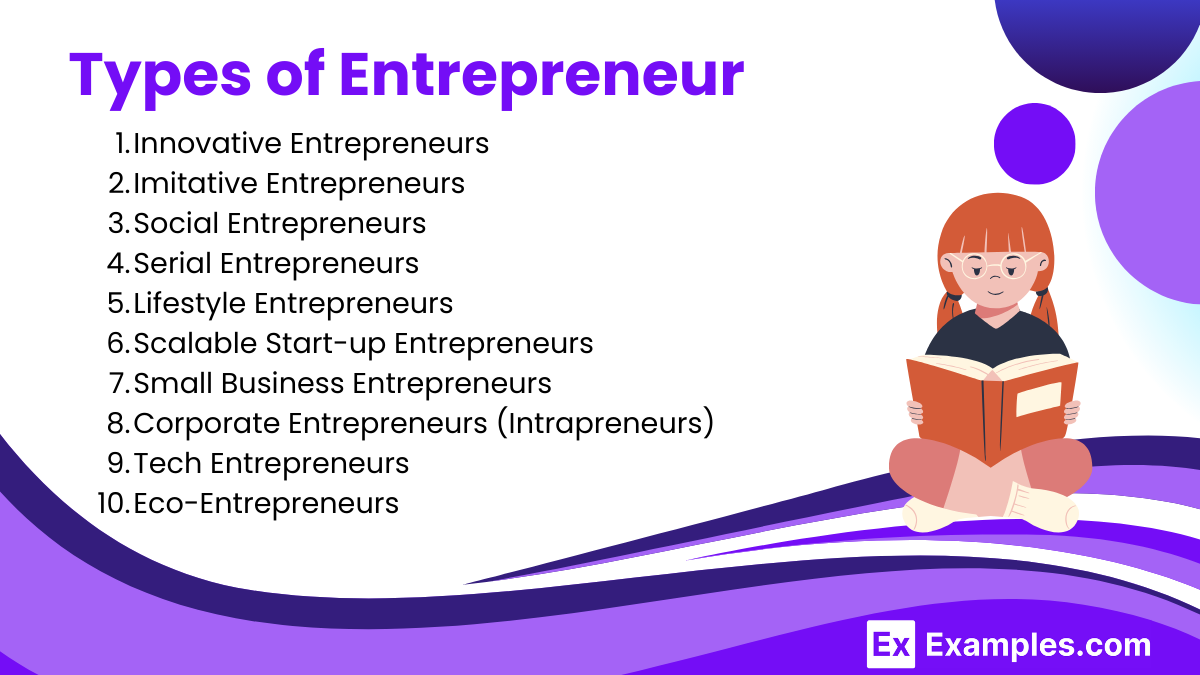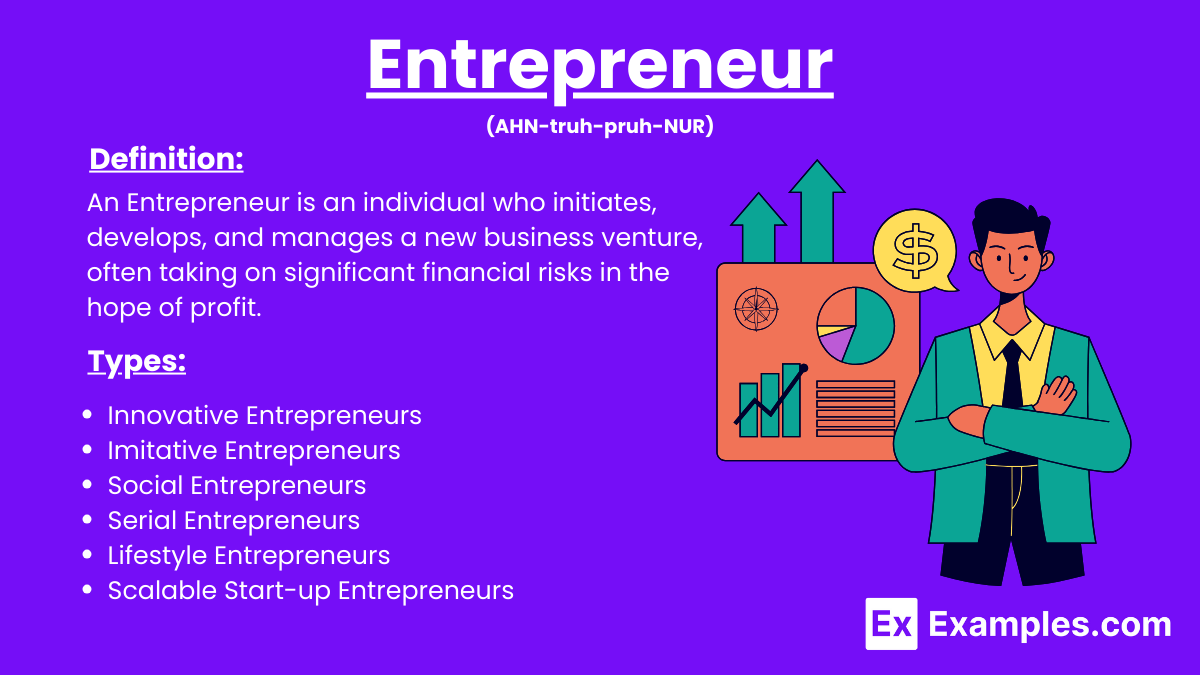Entrepreneur Examples to Download
An entrepreneur is an individual who initiates, develops, and manages a new business venture, often taking on significant financial risks in the hope of profit. Entrepreneurs typically exhibit characteristics such as resilience, adaptability, and a strong drive to achieve their goals. For success, entrepreneurs need to understand business essentials for startups and entrepreneurs, which cover the fundamental aspects of starting and running a business. Additionally, mastering finance essentials for small business is crucial for managing financial resources effectively. Crafting a compelling program sponsorship proposal can also help secure funding and support from partners, which is vital for growth and sustainability.
What is Entrepreneur?
Most Famous Entrepreneurs
- Elon Musk – Tesla, SpaceX
- Oprah Winfrey- Harpo Productions
- Jeff Bezos – Amazon
- Sara Blakely – Spanx
- Richard Branson – Virgin Group
- Mark Zuckerberg – Facebook
- Arianna Huffington – The Huffington Post, Thrive Global
- Bill Gates – Microsoft
- Jack Ma – Alibaba Group
- Larry Page – Google
- Reed Hastings – Netflix
- Indra Nooyi – PepsiCo
- Steve Jobs – Apple
- Howard Schultz – Starbucks
- Larry Ellison – Oracle Corporation
Types of Entrepreneur

1. Innovative Entrepreneurs
- Description: These entrepreneurs introduce new ideas, products, or services to the market. They are often the pioneers of change and innovation within industries.
- Examples: Steve Jobs (Apple), Elon Musk (Tesla, SpaceX).
2. Imitative Entrepreneurs
- Description: These entrepreneurs copy or adapt existing business models, products, or services. They focus on improving or modifying existing concepts.
- Examples: Franchise owners, local versions of successful international businesses.
3. Social Entrepreneurs
- Description: These entrepreneurs focus on solving social problems and creating social value. They prioritize social impact over profit.
- Examples: Muhammad Yunus (Grameen Bank), Blake Mycoskie (TOMS Shoes).
4. Serial Entrepreneurs
- Description: These entrepreneurs continuously start new businesses, often moving on to the next venture once the previous one is established.
- Examples: Richard Branson (Virgin Group), Mark Cuban.
5. Lifestyle Entrepreneurs
- Description: These entrepreneurs build businesses around their personal passions and lifestyle preferences. Their primary goal is to achieve a work-life balance while pursuing their interests.
- Examples: Travel bloggers, fitness trainers with online programs.
6. Scalable Start-up Entrepreneurs
- Description: These entrepreneurs aim to create high-growth businesses with significant scalability. They often seek venture capital to fuel rapid expansion.
- Examples: Founders of tech start-ups like Airbnb, Uber.
7. Small Business Entrepreneurs
- Description: These entrepreneurs run small businesses that serve local markets. Their focus is on stable, sustainable growth rather than rapid expansion.
- Examples: Local restaurants, retail stores, service providers.
8. Corporate Entrepreneurs (Intrapreneurs)
- Description: These entrepreneurs work within large companies to innovate and drive new projects. They act like entrepreneurs but within the framework of an existing organization.
- Examples: Managers leading new divisions or product lines within established companies.
9. Tech Entrepreneurs
- Description: These entrepreneurs focus on developing and commercializing technology-based products or services. They are often at the forefront of technological innovation.
- Examples: Bill Gates (Microsoft), Sergey Brin and Larry Page (Google).
10. Eco-Entrepreneurs
- Description: These entrepreneurs build businesses with a focus on sustainability and environmental impact. They prioritize eco-friendly practices and products.
- Examples: Patagonia, Beyond Meat.
Female Entrepreneurs
- Oprah Winfrey – Harpo Productions, OWN Network
- Sara Blakely – Spanx
- Arianna Huffington – The Huffington Post, Thrive Global
- Indra Nooyi – PepsiCo
- Sheryl Sandberg – Lean In, Facebook (now Meta Platforms Inc.)
- Whitney Wolfe Herd – Bumble
- Sophia Amoruso – Nasty Gal, Girlboss
- Ruth Fertel – Ruth’s Chris Steak House
- Kiran Mazumdar-Shaw – Biocon
- Mary Barra – General Motors (GM)
- Anastasia Soare – Anastasia Beverly Hills
- Tory Burch – Tory Burch LLC
- Diane von Fürstenberg – Diane von Fürstenberg (DVF)
- Judy Faulkner – Epic Systems
- Emily Weiss – Glossier
How to Become a Entrepreneur
1. Identify Your Passion and Skills
- Description: Determine what you are passionate about and what skills you possess that can be turned into a business idea.
- Action: Reflect on your interests, strengths, and hobbies to find potential business opportunities.
2. Research the Market
- Description: Conduct thorough market research to understand the demand, competition, and potential customer base for your business idea.
- Action: Use tools like surveys, focus groups, and market analysis reports to gather data and insights.
3. Develop a Business Idea
- Description: Generate a viable business idea that solves a problem or meets a need in the market.
- Action: Brainstorm multiple ideas, evaluate their feasibility, and select the one with the most potential.
4. Create a Business Plan
- Description: Develop a detailed business plan outlining your business goals, strategies, target market, financial projections, and operational plan.
- Action: Use templates and guides to structure your business plan and ensure it covers all essential aspects.
5. Secure Funding
- Description: Obtain the necessary capital to start and grow your business through savings, loans, investors, or crowdfunding.
- Action: Explore various funding options, prepare a compelling pitch, and approach potential investors or financial institutions.
6. Register Your Business
- Description: Legally register your business with the appropriate government authorities and obtain any necessary licenses or permits.
- Action: Choose a business name, decide on a legal structure (e.g., sole proprietorship, LLC, corporation), and complete the registration process.
7. Set Up Your Business Operations
- Description: Establish the operational aspects of your business, including location, equipment, technology, and staffing.
- Action: Find a suitable location, set up your office or storefront, purchase necessary equipment, and hire employees if needed.
8. Build a Brand
- Description: Create a strong brand identity that reflects your business values and appeals to your target market.
- Action: Design a logo, develop a brand voice, and create marketing materials that consistently convey your brand message.
9. Market Your Business
- Description: Promote your business to attract customers and build awareness through various marketing channels.
- Action: Develop a marketing strategy that includes online marketing, social media, advertising, public relations, and networking.
10. Launch Your Business
- Description: Officially open your business to the public and start offering your products or services.
- Action: Plan a launch event, use promotional tactics to generate buzz, and ensure all systems are ready for operation.
11. Monitor and Adapt
- Description: Continuously monitor your business performance and adapt your strategies as needed to achieve growth and success.
- Action: Use key performance indicators (KPIs) to track progress, seek customer feedback, and make data-driven decisions.
Characteristics of Entrepreneur
- Innovative: Develop new ideas and solutions.
- Risk-Taking: Willing to take significant risks.
- Visionary: Have a clear, forward-looking vision.
- Resilient: Persist through challenges and failures.
- Passionate: Deeply committed and enthusiastic.
- Adaptable: Flexible and quick to pivot strategies.
- Self-Motivated: Driven by internal motivation.
- Resourceful: Creative in making the most of limited resources.
- Leadership: Strong ability to lead and inspire teams.
- Networked: Build and utilize professional networks effectively.
Entrepreneur Ideas
- E-commerce Store: Sell niche products online.
- Subscription Box Service: Curated monthly product deliveries.
- Digital Marketing Agency: Provide marketing services to businesses.
- Mobile App Development: Create mobile applications.
- Freelance Services: Offer specialized freelance work.
- Online Courses and Tutoring: Develop educational content.
- Health and Wellness Coaching: Offer personalized wellness plans.
- Eco-friendly Products: Sell sustainable items.
- Home Cleaning and Organization: Provide cleaning and organization services.
- Event Planning and Management: Plan and manage events.
- Pet Services: Offer pet-related services.
- Food Truck: Serve gourmet food on-the-go.
- Real Estate Investing: Invest in properties.
- Dropshipping Business: Run an inventory-free online store.
- Virtual Assistant Services: Provide remote administrative support.
- Personal Finance Coaching: Offer financial advice.
- Tech Repair Services: Repair electronic devices.
- Travel Agency: Create travel itineraries and bookings.
- Home Renovation and Remodeling: Renovate and remodel homes.
- Subscription Software as a Service (SaaS): Offer subscription software solutions.
Importance of Entrepreneur
In running their businesses, entrepreneurs need to set a clear business agenda to outline their goals and strategies. Publishing a business annual report helps communicate the company’s performance and future plans to stakeholders. Crafting a compelling business statement can articulate the mission and vision of the enterprise. Furthermore, a thorough business evaluation essay can provide insights into the effectiveness of the business strategies and operations, offering a reflective analysis that can guide future decisions.
- Economic Growth: Entrepreneurs stimulate economic activity and GDP growth.
- Innovation: They drive progress through new ideas and technologies.
- Job Creation: Entrepreneurs create employment opportunities.
- Wealth Creation: They generate wealth, improving living standards.
- Social Change: Entrepreneurs address and solve social issues.
- Competitive Markets: They foster competition, improving quality and reducing prices.
- Adaptability and Resilience: Entrepreneurs help the economy adapt and recover.
- Community Development: They invest in and support local communities.
- Technological Advancement: Entrepreneurs advance technology and productivity.
- Global Reach: They promote globalization and international cooperation.
Uses of Entrepreneur
- Driving Economic Growth: Entrepreneurs contribute significantly to economic growth by creating new businesses. These businesses generate employment, increase productivity, and stimulate investment, contributing to the overall economic development of a region or country.
- Innovation and Creativity: Entrepreneurs are often at the forefront of innovation. They develop new products, services, and technologies that can disrupt existing markets and create entirely new industries. This innovation drives progress and improves the quality of life.
- Job Creation: Entrepreneurs create jobs by establishing new businesses and expanding existing ones. These jobs provide employment opportunities for a wide range of skills and professions, reducing unemployment rates and contributing to economic stability.
- Solving Problems: Entrepreneurs identify gaps in the market and create solutions to address unmet needs. By developing innovative products and services, they solve problems for consumers and businesses, improving efficiency and quality of life.
- Fostering Competition: Entrepreneurs introduce competition into the market, which can lead to better products and services at lower prices. This competition encourages existing companies to innovate and improve their offerings, benefiting consumers.
- Enhancing Community Development: Entrepreneurs often invest in their local communities by creating businesses that provide essential goods and services. They can also contribute to community development through philanthropy, supporting local initiatives, and promoting social responsibility.
- Capital Formation: Entrepreneurs attract investment from venture capitalists, angel investors, and financial institutions. This capital formation helps fund new business ventures, enabling growth and expansion, and providing returns for investors.
How do I become an entrepreneur?
You can become an entrepreneur by identifying a business opportunity, creating a business plan, securing funding, and launching your business.
What skills are essential for entrepreneurs?
Key skills include creativity, risk-taking, problem-solving, leadership, time management, and financial literacy.
How do entrepreneurs find business ideas?
Entrepreneurs find ideas by identifying market gaps, solving problems, leveraging personal interests, and analyzing trends.
What is a business plan?
A business plan is a detailed document outlining your business goals, strategies, market analysis, and financial projections.
How important is funding for entrepreneurs?
Funding is crucial for covering startup costs, sustaining operations, and supporting growth until the business becomes profitable.
Where can entrepreneurs find funding?
Entrepreneurs can find funding through personal savings, loans, venture capital, angel investors, and crowdfunding platforms.
What is a startup?
A startup is a newly established business, often in its early stages of operations and typically focused on innovative products or services.
How do entrepreneurs manage risks?
Entrepreneurs manage risks by conducting thorough market research, creating contingency plans, diversifying income streams, and maintaining financial discipline.
What role does innovation play in entrepreneurship?
Innovation is vital as it differentiates businesses, attracts customers, and creates competitive advantages.
How important is networking for entrepreneurs?
Networking is essential for building relationships, gaining mentorship, finding investors, and discovering business opportunities.


